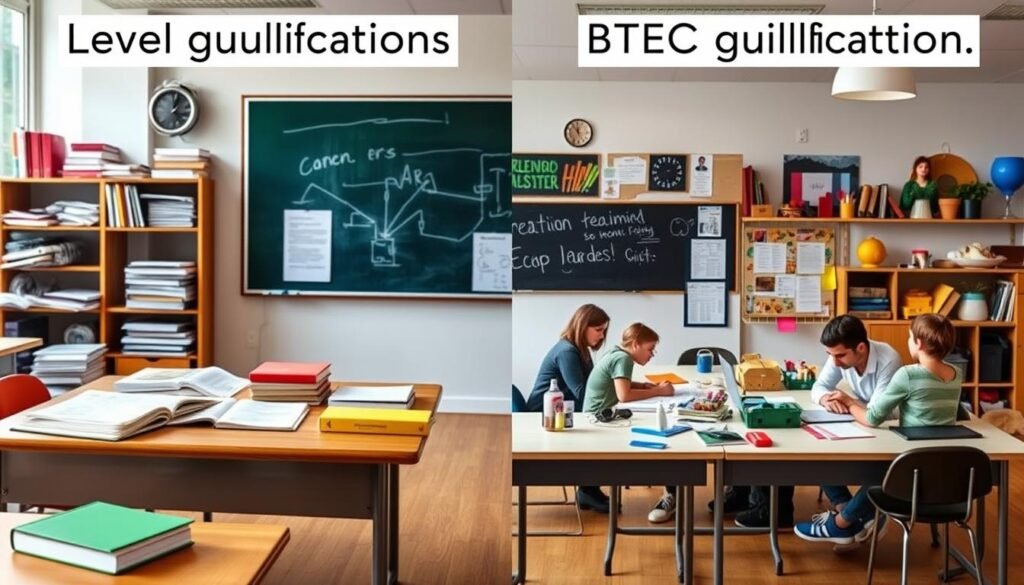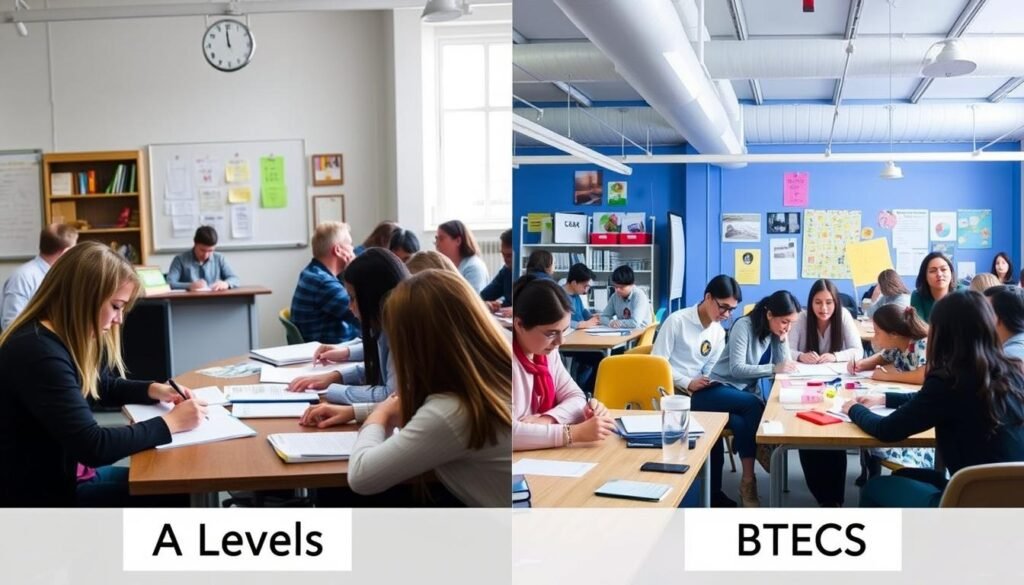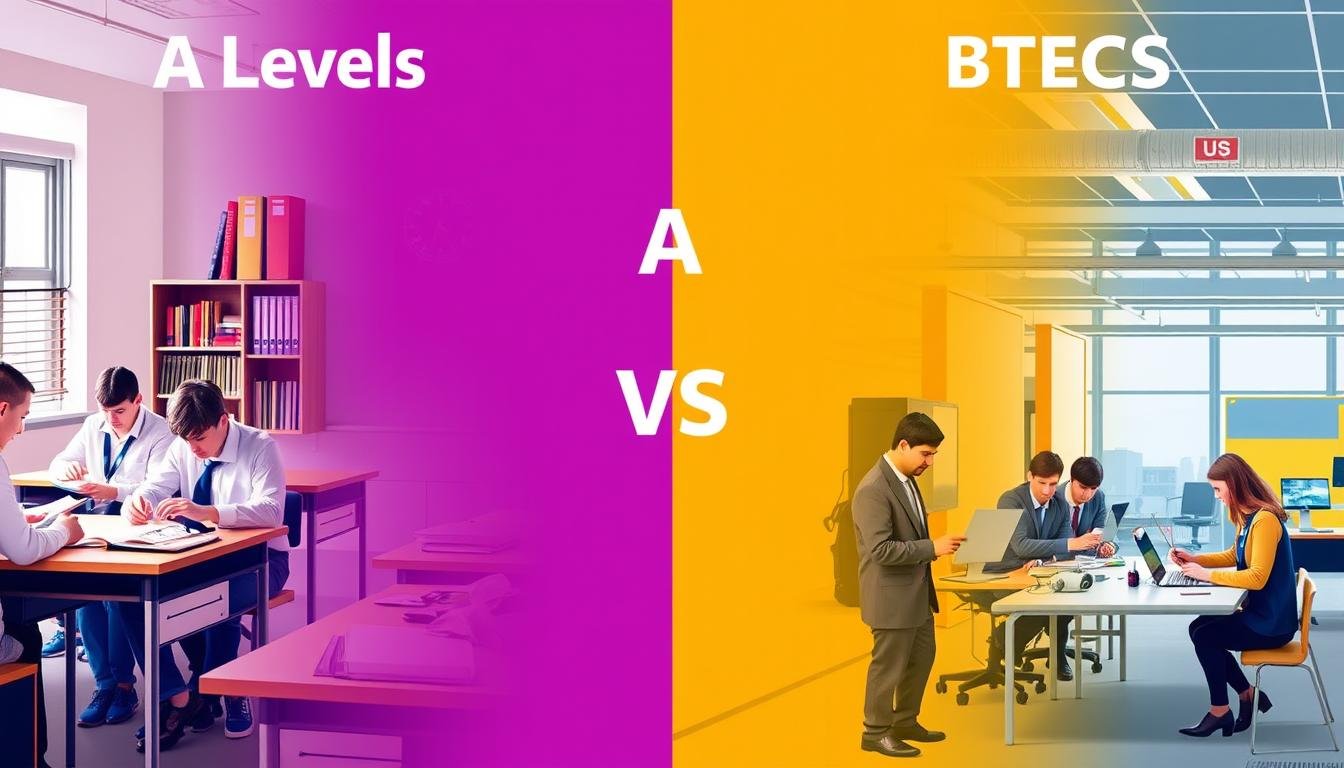Understanding the differences between A Levels and BTECs is key. Each qualification affects your future studies and career. It’s essential to think carefully about which one to choose. You need to consider your strengths, interests, and goals.
In the UK, students often choose between A Levels and BTECs. Knowing the main differences helps ensure you pick the right path. The decision between A Levels and BTECs can seem daunting. But, by looking at what each offers, you can make a better choice.
Key Takeaways
- Understanding the differences between a level and btec is crucial for making an informed decision.
- Considering individual strengths, interests, and goals is essential when choosing between a level and btec.
- The a level vs btec decision can significantly impact future academic and career prospects.
- Students must weigh the options carefully to choose the path that best suits their needs.
- Examining the unique characteristics of each qualification can help students make a more informed choice.
- Both a level and btec qualifications have their strengths and weaknesses, and students should consider these when deciding.
Understanding A Level vs BTEC Qualifications
Choosing between A Level and BTEC qualifications is a big decision. It can affect your future education and career. Knowing what each option offers is key to making the right choice.
What Are A Levels?
A Levels are academic qualifications for students in the UK aged 16-18. They allow in-depth study in up to three subjects. This prepares students for university and academic careers.
What Are BTECs?
BTECs focus on practical skills and knowledge. They are great for students who learn better by doing. BTECs cover many subjects and are valued by employers and schools.
Key Differences Overview

When comparing A Levels and BTECs, there are key differences:
| Aspect | A Levels | BTECs |
|---|---|---|
| Focus | Academic theory | Practical skills |
| Study Style | Exam-based | coursework and projects |
| Duration | 2 years | 1-2 years |
| Recognition | Universities and colleges | Employers and some institutions |
Assessment Methods and Study Styles
A Level versus BTEC assessments cater to different learning preferences. A Levels mainly use end-of-course exams. These exams test students’ understanding under timed conditions.
BTECs, on the other hand, mix coursework, practical assessments, and exams. This method lets students show their skills and knowledge through ongoing assessment.
When choosing between a level and btec, weighing the pros and cons is key. Knowing these can guide you in making a choice that fits your strengths and goals.
- A Levels Pros: They focus on deep theoretical knowledge, are widely accepted by universities, and are great for academic careers.
- A Levels Cons: The exam-heavy approach can be stressful, and there’s less emphasis on practical skills.
- BTECs Pros: They offer practical and coursework-based assessments, focus on skill development, and are good for vocational paths.
- BTECs Cons: They might not be as well-known for some academic courses, and the continuous assessment can be demanding.

Here’s a comparison of A Levels and BTECs in terms of assessment methods and study styles:
| Aspect | A Levels | BTECs |
|---|---|---|
| Assessment Methods | End-of-course examinations | Coursework, practical assessments, and exams |
| Study Style | Theoretical and exam-focused | Practical and continuous assessment |
| Stress Management | High during exam periods | Ongoing coursework deadlines can be stressful |
| Skill Development | Analytical and critical thinking | Practical skills and applied knowledge |
Course Structure and Duration
When deciding between a levels or btec, it’s essential to look at their structure and duration. Knowing these details helps you choose the proper qualification for your goals.
A Level Programme Structure
A level qualifications last two years. In the first year, students do AS levels, covering the basics of their subjects. The second year is for A2 levels, where they dive deeper into their subjects. This setup helps students get ready for university.
BTEC Course Format
BTEC courses are more flexible, with levels to fit different needs. They focus on practical skills and real-world use, which is great for hands-on learners. Like a level, BTEC courses usually take two years to finish.
Time Commitment Differences
The time needed for a levels or btec courses varies. A levels require steady study over two years, with exams and coursework. Btec courses, however, have more project-based work, letting students manage their time better. Considering these differences to match your schedule and learning style is key.
Subject Availability and Specialisation Options
Choosing between Btec vs A levels means looking at the subjects they offer. A level exams have a wide range of traditional subjects. This lets students pick and choose, preparing them for university.
BTEC qualifications focus on vocational and industry-specific areas. They’re great for students who know their career path. Popular BTEC areas include business, engineering, health and social care, and creative industries.
Both qualifications allow for specialisation but in different ways. A Levels let students mix subjects for a broad base. BTECs dive deep into a field, giving practical skills for their chosen industry.
Think about your interests and career goals when looking at subjects and specialisation. Whether you like the broad study of A Levels or the practical skills of BTECs, knowing what each offers helps you choose wisely.
University Recognition and UCAS Points
It’s essential to know how universities check your qualifications. Both A level subjects and BTEC Level 3 qualifications are well-known. However, they are used in different ways when applying to university.
How Universities View Each Qualification
Universities see A levels as deep knowledge and BTEC Level 3 as practical skills. This mix helps universities meet the needs of different students and courses.
Converting Grades to UCAS Points
UCAS points are key in university applications. A level grades are quickly turned into UCAS points, making them easy to compare. BTEC Level 3 qualifications also get UCAS points based on grades, making them competitive with A levels.
Russell Group University Preferences
Russell Group universities accept both A levels and BTEC Level 3 qualifications. But, they might look for higher UCAS points from BTECs for challenging courses. This is because A levels are seen as more academically challenging.
| Qualification | UCAS Points | Russell Group Preference |
|---|---|---|
| A Level | 56 points for A*, 48 for A, 40 for B | Widely accepted |
| BTEC Level 3 | 56 points for D*D*, 48 for D*, 40 for D | Accepted, may require higher grades |
Career Pathway Considerations
Choosing between A Level or BTEC can shape your future career path significantly. A Level vs BTEC options offer distinct advantages depending on your goals.
A Levels are ideal for those aiming for university degrees and academic professions. They provide strong theoretical knowledge, which is beneficial for subjects like medicine, engineering, or law.
BTECs are perfect for students interested in vocational careers. They focus on practical skills and industry-specific knowledge, making them suitable for fields like business, health care, or creative industries.
- A Level: Emphasizes critical thinking and independent study.
- BTEC: Offers hands-on experience and workplace connections.
Understanding the differences between A Level and BTEC helps align your education with your long-term career goals. Whether you choose a level or btec, consider how each qualification prepares you for the world of work and the opportunities they provide.
Skills Development Comparison
When deciding between A Level and BTEC, it’s key to see how each shapes different skills. This comparison shows the unique benefits of each path.
Academic Skills in A Levels
A Levels boost skills like critical thinking, analytical writing, and exam techniques. They delve into theoretical ideas, laying a solid base for university.
Practical Skills in BTECs
BTECs focus on practical, job-specific skills. They offer real-world experience and technical skills, readying students for work or vocational training.
Transferable Skills Development
Both A Levels and BTECs build important transferable skills. These include managing time, working in teams, and solving problems, crucial for both education and the job market.
| Skill Type | A Levels | BTECs |
|---|---|---|
| Critical Thinking | Strong focus on theoretical analysis and evaluation. | Applied critical thinking in practical scenarios. |
| Communication | Emphasis on essay writing and presentations. | Focus on verbal communication and technical reporting. |
| Technical Skills | Limited technical application. | Industry-specific technical expertise. |
| Time Management | Managing study schedules for multiple subjects. | Balancing practical projects with coursework. |
| Problem-Solving | Theoretical problem-solving in exams. | Practical problem-solving in real-world tasks. |
Cost and Funding Implications
When deciding between choosing between a level and btec, knowing the costs is key. Both options have different prices that can sway your choice.
A Levels are often cheaper because you only need textbooks and stationery. BTECs, however, might cost more due to special equipment or resources needed for the subject.
There are also different funding options. A Level students can get scholarships and bursaries. BTEC students might find grants or sponsorships from employers. It’s important to look into these to help with costs.
Thinking about the future, A Levels can make university entry easier, but they might mean higher tuition fees. BTECs, on the other hand, can lead to jobs right away, affecting your future earnings.
| Aspect | A Levels | BTECs |
|---|---|---|
| Course Fees | Generally lower, mainly textbooks and stationery | May include costs for specialised equipment and resources |
| Additional Costs | Minimal | Possible fees for lab materials or industry-specific tools |
| Funding Options | Scholarships, bursaries | Industry grants, employer sponsorships |
| Long-term Implications | University recognition, potentially higher tuition fees | Immediate employment opportunities, varied earning potential |
Common Myths and Misconceptions
Choosing between A levels or Btec courses often comes with several misconceptions. Understanding the facts can help make a more informed decision.
Academic Rigour Myths
Many believe that A level qualifications are significantly more challenging than btec courses. While A levels focus on theoretical knowledge, btec courses emphasize practical skills. Both pathways require dedication and offer rigorous academic standards tailored to different learning styles.
Employment Prospects Myths
There’s a perception that employers prefer A levels over btec courses. In reality, many industries value the hands-on experience that btec courses provide. Employers seek candidates with relevant skills and practical knowledge, making both qualifications valuable depending on the career path.
Social Stigma Issues
Some think that taking btec courses might carry a social stigma compared to A levels. However, societal views are changing, and more people recognize the benefits of vocational education. Choosing a level qualifications or btec courses should be based on personal strengths and career goals, not on outdated stereotypes.
Making Your Decision: Key Factors to Consider
Deciding between btec vs a levels is a big choice that can affect your future. First, think about how you learn best. If you do well in doing things yourself, btec qualifications might be for you.
Also, think about what job you want. Some jobs need the book smarts from a level exams. Others want the skills you get from BTECs.
Look at your university plans. Check what each course needs to get in. Some places might prefer one over the other.
Look at what you’re good at and what you find hard. If you’re great at studying alone and thinking deeply, A Levels might be better. But if you like working with others and doing things, BTECs could be the way to go.
For help, talk to teachers, career advisors, or experts in education. They can give advice based on your school work and what you want to do.
| Factor | A Levels | BTECs |
|---|---|---|
| Learning Style | Theoretical and independent study | Practical and hands-on |
| Career Aspirations | Professions requiring deep academic knowledge | Careers valuing practical skills |
| University Goals | Widely accepted for most courses | Accepted, but check specific requirements |
| Strengths | Critical thinking and analysis | Collaboration and applied learning |
Conclusion
Choosing between A level subjects and BTEC Level 3 qualifications depends on your strengths and career goals. A Levels are great for those aiming for university. They offer a deep dive into academic subjects.
BTEC Level 3 courses, however, focus on practical skills. They are perfect for students who prefer hands-on learning. BTECs are recognised by employers and many universities, especially for UCAS applications.
Both qualifications are respected and can lead to success. Think about what fits your learning style and future plans. Reflect on your interests and how each qualification can help you achieve your goals.
Get all the information you need and weigh the benefits of each option. Whether you choose A Levels or BTECs, sticking to your path is key. Use the insights from this comparison to make a choice that suits you best.
FAQ
What are the main differences between A Levels and BTECs?
A Levels focus on academic subjects and are mainly tested through exams. BTECs, on the other hand, are about practical skills and are tested through coursework and projects. This makes BTECs great for those who want to get into specific careers.
Which is better: A Level or BTEC?
It really depends on what you want to do after school. A Levels are good for university, especially in traditional subjects. BTECs are better for careers that need practical skills, like engineering or healthcare.
How do A Levels and BTECs compare in terms of UCAS points?
Both can help with university applications. A Levels are straight UCAS points. BTECs are worth points based on their level and size. Always check what universities need.
Are BTECs recognized by universities as equivalent to A Levels?
Yes, many universities see BTECs as equal to A Levels, especially when you mix them with A Levels. But, it’s different for each university and course. Always check their entry requirements.
What are the pros and cons of choosing A Levels vs BTECs?
A Levels are great for university and offer deep knowledge in subjects. But, they’re all about exams and don’t give much practical experience. BTECs are perfect for careers that need hands-on skills but might not be as good for university subjects.
Which qualification should I choose for a vocational career?
For a career that needs practical skills, BTECs are the best choice. They offer skills and knowledge that are useful right away. BTEC Level 3s are especially valued in fields like engineering and healthcare.
Can I study A Levels and BTECs together?
Yes, you can take both A Levels and BTECs. This mix gives you the best of both worlds. It makes your university application stronger and gives you a well-rounded education.
How are A Levels and BTECs assessed differently?
A Levels are mostly exams at the end of the course. They test your understanding of subjects. BTECs have exams, coursework, and projects. They focus on skills you can use in your future job.
What subjects can I study in BTECs compared to A Levels?
A Levels cover a wide range of subjects like Maths and English. BTECs focus on vocational subjects like Business and IT. It’s up to you whether you want to learn more about subjects or get ready for a career.
Do BTECs offer more practical skills than A Levels?
Yes, BTECs are all about practical skills for specific jobs. They include work placements and projects. A Levels are more about theory and academic skills, which are good for university but not as practical.



